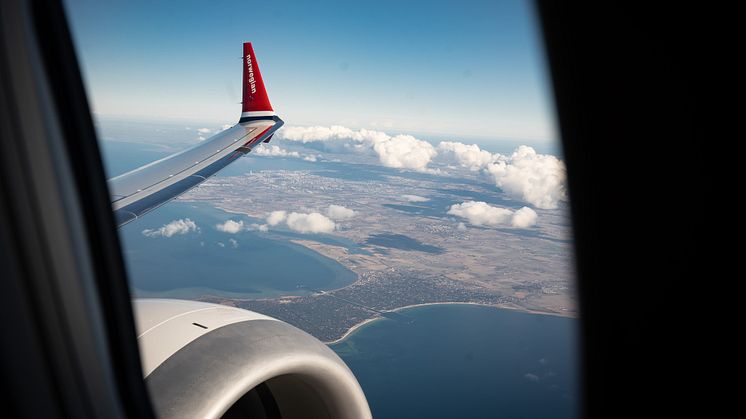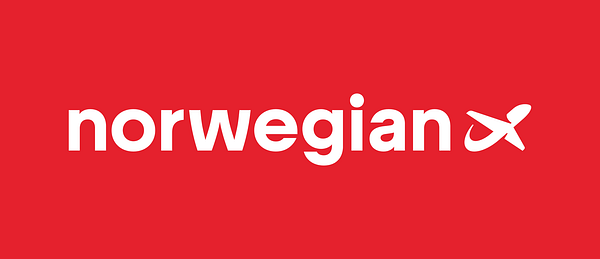
Press release -
Norwegian partners with Norsk e-Fuel to build new e-fuel plant in Norway
Norwegian has announced a landmark partnership with Norsk e-Fuel to build the world’s first full scale e-fuel plant in Mosjøen, Norway. The plant will produce sustainable aviation fuels (SAF), marking an important milestone towards Norwegian's target of 45 percent emissions reduction by 2030.
Norwegian has signed a strategic partnership agreement with Norsk e-Fuel, with the ambition to secure long-term offtake of SAF and an equity stake in the company. The partnership will contribute to speeding up the production and availability of SAF in favour of a more sustainable aviation industry. The parties aim to finalise the detailed agreement within the next few months.
“We are moving Norwegian into the future. Our sector contributes to great value creation, both socially and economically, and we commit to significantly reducing our climate impact as we take advantage of technological advances within aviation fuel. E-fuels can become a gamechanger for aviation. The partnership with Norsk e-Fuel is a landmark agreement for Norwegian, but also a milestone for aviation in Norway. It helps us move closer to the promise we have given our customers. We want to make it possible for everyone to fly sustainably,” said Geir Karlsen, CEO of Norwegian.
Together for a future-proof, sustainable aviation sector
The goal is to start producing e-fuels in Mosjøen in Northern Norway as early as 2026. The partnership with Norsk e-Fuel is estimated to secure approximately 20 percent of Norwegian’s total demand for SAF until 2030. In addition, Norwegian will invest more than NOK 50 million for a minority equity stake in the company. These measures will contribute to reaching Norwegian’s goal of a 45 percent emission reduction by 2030. They also positively impact the European aviation industry’s goal of net zero CO2 emissions by 2050.
“Sustainable aviation fuels need to become both more available and less expensive. To make this a reality, the aviation industry depends on collaborating with public authorities to close the price gap between fossil fuels and e-fuels. Ultimately, e-fuels will be able to compete with and replace fossil fuels. Time is crucial and we are very eager to get started,” said Karlsen.
Investing in the world’s first full scale e-fuels production facility
Norsk e-Fuel looks to accelerate the industrialisation of e-fuel production starting in Northern Norway. The Norwegian project developer is backed by a strong group of shareholders consisting of technology pioneers and industrial experts. The company's first production facility will be located in Mosjøen in Northern Norway. It will become the world’s first full scale e-fuels production facility. The area has some of the lowest electricity prices in Europe as well as stable access to renewable energy from hydropower. This provides a considerate competitive advantage, as electricity constitutes a significant cost element in the production of e-fuels. Mosjøen has a port and rail infrastructure as well as a long-standing processing industry tradition.
“Today, we are announcing a partnership that will take a leading role in the transition to sustainable aviation. This is quite unique. With its ambitions to reduce CO2 emissions, Norwegian is a role model for the aviation industry. We are looking forward to many more joining us on the journey,” said Lars Bjørn Larsen, CCO of Norsk e-Fuel.
By teaming-up with Norsk e-Fuel, a local producer of e-fuels, Norwegian wants to speed up the transition from fossil to alternative fuels. The partnership with Norsk e-Fuel offers early and long-term access to much-needed sustainable aviation fuel.
“The country of Norway depends on a strong, future-proof aviation industry. Our partnership with Norsk e-Fuel is a historic step for Norwegian as an airline. We are actively supporting the Norwegian processing industry and contributing to local economic growth, whilst at the same time taking a major leap towards making sustainable air travel a reality. To us, this marks the beginning of a new era, and we will consider entering into several future partnerships to achieve our climate goals,” said Karlsen.
About e-fuels
E-fuels, the common abbreviation of so-called electricity-based fuels, are a class of synthetic fuels that are manufactured using captured carbon dioxide, together with green hydrogen obtained from sustainable electricity sources.
Norsk e-Fuel follows the concept of “take what we have and turn it into what we need”. For the production of e-fuels, the facility will use 100 percent renewable energy, water and recycled biogenic CO2 and CO2 from direct air capture and turn them into sustainable fuels. The final product reduces greenhouse gas emission by 99 percent compared to fossil fuels as calculated according to EU ETS InnovFund scheme and audited by DNV.
About Norsk e-Fuel
Norsk e-Fuel was founded in 2019 to drive the transition to renewable aviation by establishing the industrial production of sustainable fuels based on CO2 and water.
Supported by five strategic investors and carefully selected partners, Norsk e-Fuel is set to bring Power-to-Liquid production to industrial scale. As project developer, Norsk e-Fuel is establishing large-scale production sites to deliver synthetic fuels to the aviation industry. The company is determined to develop a new value-chain for sustainable fuels, starting with a first production facility to be located in Mosjøen, Norway.
Contact Norsk e-Fuel: Lars Bjørn Larsen, CCO, +47 930 19 169; lblarsen@norsk-e-fuel.com

Topics
Categories
About Norwegian
Norwegian is the largest Norwegian airline and one of Europe’s leading low-cost carriers. The company has around 4,500 employees and offers a comprehensive route network between Nordic countries and destinations in Europe. Since 2002, more than 300 million passengers have flown with Norwegian. The most important task has been to offer affordable plane tickets to all and to offer more freedom of choice along the journey.
Norwegian is a driving force for sustainable solutions and the transformation of the aviation industry. The company’s goal is to reduce its CO2 emissions by 45 percent within 2030. To this means, the company is renewing its fleet, promoting sustainable aviation fuel, reducing its waste, and using wind and weather data to calculate the most efficient fuel-saving flights routes. Norwegian wants to become the sustainable choice for its passengers.




